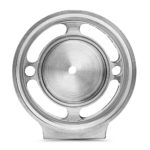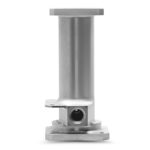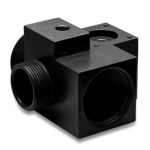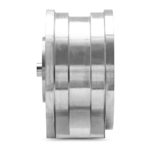
Growing and maintaining a CNC machine shop is a very challenging and time consuming venture. The uphill battle of entering a crowded market place is a daunting challenge. Not to mention competing with other well established machine shops is a endeavor not for the faint of heart.
With the large shift of globalization in the manufacturing space, how can CNC machine ships secure long term contracts and grow with all the existing roadblocks that are in place?
Here are some tips and suggestions for small CNC machine shops to continue growing their businesses.
Develop Partnerships
In the early days of start up CNC machine shops, you deal with the uncertainty which can include low volume jobs, lack of sustainable clients, or being able to ensure there is enough work to justify and meet your staffing needs. In situations like these, existing relationships and business connections can turn out to be a very valuable asset to a shop just getting on its feet.
Developing and entering partnerships with customers is an ideal way to begin to lay a foundation to generate a steady stream of work. Building upon your current connections can give you a large advantage but not the only option. In this day and age there are various networking events within the manufacturing industry that will give you the ability to meet and interface with potential clients. They also give you a feel for the overall marketplace and where you see yourself within it.
Target Your Segment of the Marketplace
When you are getting your machine shop off the ground, it is important to look at focusing on specific types of industries. Whether you are looking at focusing the type of work to specialized aerospace parts, or even automotive parts. The goal is the ensure new relationships with companies are formed so you can not only get repeat orders. As well as show the quality of your work to look at expanding into other parts those customers may need in the future.
Targeting your specific industries will help you make the best use of your shops capabilities. There are a large number of shops that make a great deal of revenue only focusing on a limited niche market. As your revenue stream and company grows, you can then look at expanding into other industries. Another area to help in targeting your specific segments is to leverage the available technologies to help improve your companies visibility and reach more buyers.
Technologies such as your own website, viral videos, and growing your social media platforms for your company are essential tools to gain traction. These tolls will help get your work and your companies profile out in front of the right people in the large organizations looking for reputable CNC machine shops like yours.
Diversify According to Demand
While it’s sometimes a bad idea to take on a job outside the capabilities of your shop when you’re just starting, new projects that seem within reach and will provide a cost-effective result can be a helpful way to diversify your operations. If, for example, a lathing shop has the training and funds to undertake a profitable milling or fabrication contract, then the resulting diversity can help provide sustainable growth even during periods when one sector of the market is on a down swing.
Diversification of jobs also can span the industries you support. This was very evident during the heights of the pandemic where specific industries were hit especially harder than others. So ensuring your customer base is diverse and spans a broad range of products can help mitigate potential risks that may be introduced when unforseen market fluctuations occur.
Don’t Rush to Expand
While everyone is looking for ways to quickly grow their businesses, we must also ensure that every step that is taken is calculated and the risk vs. reward benefits are weighed. Decisions such as to begin purchasing additional machines that are not going to be productive, or expanding into larger facilities without the required engineering staff. These could potentially not only reduce the ability of the business to grow but might be a terrible detriment on the shops bottom line in the short and long run.
Instead, it would be more prudent to concentrate on making smaller steady gains rather than massive leaps forward, as even a small shop with a handful of machines or employees can still meet or exceed the productivity average of a large number of larger shops.
Remain Open to New Technology
Although new technical innovations can be costly in terms of additional training and initial set-up. Taking advantage of newer technologies may have a positive long-term effect. Things such as simplifying production methods or providing the means to accomplish tasks that were once considered impractical. New technology can sometimes help a business remain competitive, especially if the innovation gains widespread notice.
Shop owners might want to consider purchasing more manufacturing equipment to fulfill existing and future orders. This can be a difficult decision to make, as future growth isn’t guaranteed and buying equipment has many upfront costs. On the positive side, however, new machinery equipment will increase production capacity and improve cycle times, which will, in turn, create more opportunities for your business. Business owners must weigh the risks versus the rewards — and again, communicate your efforts to your team accordingly.
Shop machinery is not the only way to technology can help with reducing and streamlining costs. Implementations of ERP solutions such as JOBBOSS can drastically reduce overhead costs and provide insight into how shops can increase profitability.
You can read our recent write up on the ERP platform here
Short Run Jobs vs. Long Run Jobs
When starting out, building relationships with new companies is key. Often times, the early work that could be provided might be protypes, or test peices that are not going to be used in a production capacity. These orders while are good to get, may be limited to 1 to 10 pieces which would classify it to be a short run job.
Short run jobs are fine, but the overhead can be quite high. When we factor in machine setup time, programming, run time and various other factors, the per piece cost does tend to be higher. In contrast, long run jobs that may be for example a 1000 pieces would have a lower price point per part. While all the factors that the short run job would have still apply, the fact that we are replicating the same parts in high quantity is a key factor to increase profitability.
Take advantage of government opportunities
Government contract opportunities are an area where a shop can also look at securing machining jobs. A very good resource would be to visit the https://sam.gov website and register your company so you can start looking at RFP opportunities that are published there under Contract Opportunities. A good way to try to filter the RFP list is to search under the The NAICS Code for Machine Shops which is 332710.
The North American Industry Classification System (NAICS) is the standard used by Federal statistical agencies in classifying business establishments for the purpose of collecting, analyzing, and publishing statistical data related to the U.S. business economy. More information can be found here https://www.naics.com
Final Thoughts
In closing, we hope you have found these insights helpful. Whether you are thinking about getting a new CNC Machine Shop off the ground, or are trying to expand your business. We here at JAH Machine believe precision manufacturing in the USA plays a very important role in our every expanding world. As with any new venture there will be moments of uncertainty and doubt due to factors that you can control and others you cannot. But if you stay the course and grow your customers over time, you will look back on your journey with great satisfaction.
Good Luck from the Team here at JAH Machine!









